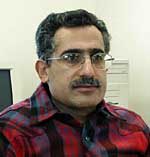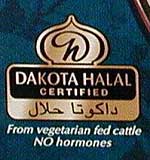By Dan Gunderson
Minnesota Public Radio
January 17, 2002
|
| RealAudio |
A group of North Dakota ranchers hope to get a better price for their beef by selling it to Muslims in the U.S. A new processing plant in Harvey, N.D. kills cattle and processes the meat in accordance with Muslim religious rules. The ranchers are also targeting health conscious consumers.
| |
|
|
|
||
John Cable is the third generation to raise cattle on his ranch in north central North Dakota. Leaning on the top rail of a feedlot, he studies a few dozen calves who have just been weaned.
The animals will be fed for about a year before they're ready for slaughter. They are fed a carefully-controlled diet of corn, grain and vitamins and minerals. What's notable on John Cable's ranch is what's not in the animals' feed.
Most cattle feed contains some animal byproducts, typically pork. To be Halal, or acceptable to Muslims, food must contain no animal byproducts. Muslims cannot eat any form of pork.
These animals also get no growth hormones. Most cattle are given hormones so they grow faster and reach market weight more quickly. "We have been totally hormone-free, totally byproduct-free, for a year," said Cable.
It takes 30 to 60 days longer to get the animals to market weight, he said. The extra time means it costs more to raise the animals, but the payoff comes in higher prices when the animals are slaughtered.
In the past, Cable loaded his animals on a truck and sent them to a slaughtering plant in South Dakota or Nebraska. In the future, he'll truck them just a few miles down the road to a new processing plant in Harvey, N.D.
The Dakota Halal plant is less than a year old. It employs 19 people, working two shifts a day.
Adnan Aldayel is president of the company, and the man who often slaughters the animals. The cattle must be killed facing east, toward Mecca, by a Muslim who offers a blessing and invokes the name of Allah.
| |
|
|
|
||
Respect for the animal is an important part of the process.
"When you look the animal in the eye before the animal dies, that's important. It makes you appreciate life and remember God," said Aldayel.
Aldayel is a native of Saudi Arabia. When he moved to the United States about a decade ago it was difficult to find Halal food in grocery stores. He was interested in Halal food, and when he learned North Dakota ranchers wanted to process their own beef, he quickly saw an opportunity.
North Dakota may seem like a strange place to produce Halal beef, but Aldayel insists North Dakota beef is the best in the world. He claims the Dakota Halal plant is the only one in the U.S. that monitors beef from birth to packaging to ensure purity.
The potential market is huge, according to Aldayel. There are seven million Muslims living in the United States. He also hopes the carefully monitored beef will appeal to health conscious consumers.
The North Dakota plant now ships red meat and processed meats, like beef sausage and beef bacon, to the Twin Cities, Detroit and Chicago. It recently began offering the Zem Zem line of ready-to-eat meals. The plant also produces Sheyenne Valley brand of hormone-free beef for non-Muslim consumers.
The Dakota Halal plant is self-contained. Every ingredient in every product is researched to be sure it conforms to strict Muslim requirements. All recipes are developed and tested in the research kitchen.
| |
|
|
|
||
"It's impossible to compete with huge meat packers on price," said Aldayel, so quality is the edge he's counting on to make this plant a success.
It's a challenge to market a product from the middle of North Dakota, according to Aldayel. He doesn't have a lot of money for advertising. Arranging shipping for products is sometimes a challenge. But he's confident this plant will turn a profit in two or three years.
Aldayel has a vision of similar small meat processing plants in South Dakota, Montana and Minnesota.
"We're hoping - after we prove we're successful - we can replicate what we have here into different areas," said Aldayel. "Involving farmers and ranchers is very important because they're the ones being left short. They are being shut out by the meatpacking industry."
More than 50 North Dakota ranchers have invested in this plant. Old cattlehands like Paul Kallenbach see it as a way to break free from big meatpackers.
"It's a stake in our future. Hopefully it'll bring a better return," says Kallenbach. "When we ship it to IBP it's a commodity beef. Traditionally, that's what's been wrong with agriculture. We take what we get, not what we're asking."
Adnan Aldayel readily admits there are many obstacles to success. Most consumers shopping for groceries are not keen to pay a premium price for beef, if they can get it more cheaply in the next freezer case.
The company also has a very limited advertising budget, making it difficult to break into new markets. But for one group of North Dakota ranchers, it's a gamble they're willing to take.
More Information


